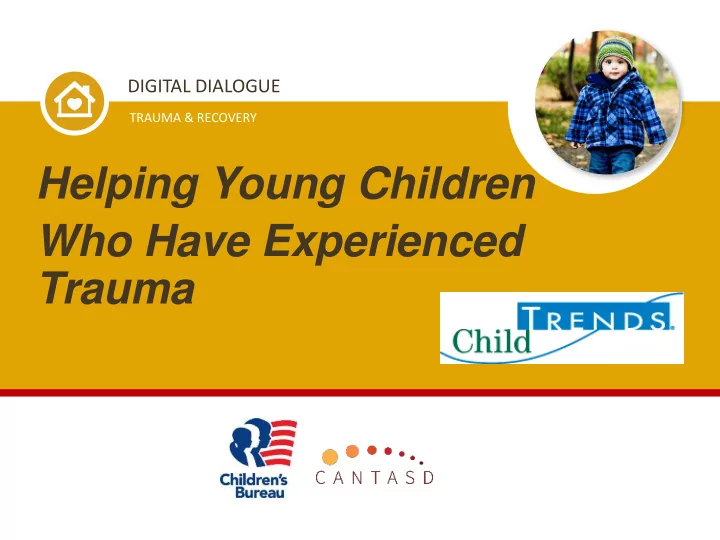

DIGITAL DIALOGUE TRAUMA & RECOVERY Helping Young Children Who Have Experienced Trauma
Speakers Join the National Conversation on Child Abuse GUEST and Neglect Jessica Dym Bartlett, MSW, PhD Senior Research Scientist Child Trends WELCOME Sharon McKinley Program Specialist Children’s Bureau’s MODERATOR Office on Child Abuse Nilofer Ahsan and Neglect Lead, Knowledge & Partnerships CANTASD www.cantasd.org
Definition of Early Childhood Trauma Join the National When a young child experiences an event that causes Conversation on Child Abuse actual harm or poses a serious threat to the child’s and Neglect emotional and physical well-being. Different from regular life stressors because it causes a sense of intense fear, terror, and helplessness beyond the normal range of typical childhood experiences. www.cantasd.org
Early Childhood Trauma Join the National Conversation on Child Abuse Affects almost half of all U.S. children (35 million) and Neglect Disproportionately affects young children Examples: abuse & neglect, separation/loss of a parent, serious injury, domestic violence Myths: Young children don’t remember traumatic events; they always “bounce back” Sources: APA Presidential Task Force on Posttraumatic Stress Disorder and Trauma in Children and Adolescents(2008); National Survey of Children’s Health (2011/12); www.cantasd.org USDHHS/ACF/ACYF/Children’s Bureau (2017).
Join the National Conversation on Child Abuse and Neglect www.cantasd.org
Meeting the Needs of Young Children Who Have Experienced Trauma Join the National Conversation on Child Abuse • Presence and continuity of a nurturing caregiver and Neglect • Environments that promote: • Safety and trust • Self-regulation and social-emotional skills • Other early skills needed to succeed in school www.cantasd.org
Nurturing Adults Can Provide Trauma-Informed Care • Facilitate children’s coping by helping them Join the National Conversation process events. on Child Abuse and Neglect • Provide predictable routines and expectations. • Identify and limit exposure to triggers and help children cope. • Protect children from re-traumatization. • Promote children’s self-regulation skills. • Support early learning. • Access community services and supports. www.cantasd.org
Parents and other caregivers need information on: • The impact of trauma on children Join the National Conversation on Child Abuse • Effective ways of identifying and and Neglect addressing trauma • Promoting parental well-being • Evidence-based/-informed community services and supports • Ways to cope with and prevent secondary stress www.cantasd.org
Impact on Parents and Families Join the National • Parenting a trauma-exposed child is stressful. Conversation • Stress may lead to insensitive caregiving. on Child Abuse and Neglect • Parents may experience the same trauma (e.g., domestic violence, accident). • Negative reactions in parent or child may intensify the other’s symptoms. • Challenges related to child trauma may lead to family conflict. www.cantasd.org
Resources Join the National • Helping young children who have experienced trauma: Conversation on Child Abuse Policies and strategies for early care and education and Neglect • National Child Traumatic Stress Network: Early childhood trauma • Excessive stress disrupts the architecture of the developing brain • SAMHSA’s concept of trauma and guidance for a trauma-informed approach • Trauma-Informed Practice • Developing a Trauma-Informed Child Welfare System • Resource Guide to Trauma-Informed Human Services www.cantasd.org
Thank You & Next Steps Join the National Conversation on Child Abuse • Download the handouts to learn more. Click on the and Neglect files in the “Handouts” box on your screen. • Do you have innovative ideas, questions or concerns about trauma and resilience? Tell us about your work. Send an e-mail to hello@CANTASD.org with “Trauma and Resilience” in the subject line. www.cantasd.org
Participant Feedback Join the National Conversation on Child Abuse and Neglect Thank you for your participation! How useful was this session? Additional Comments: hello@CANTASD.org www.cantasd.org
Recommend
More recommend